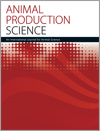
Animal Production Science
Volume 61 Number 6 2021
AN20400Wastes to profit: a circular economy approach to value-addition in livestock industries
 , Bernadette McCabe, Paul D. Jensen, Robert Speight, Mark Harrison, Lisa van den Berg and Ian O'Hara
, Bernadette McCabe, Paul D. Jensen, Robert Speight, Mark Harrison, Lisa van den Berg and Ian O'Hara
As an important and central industry to the production of goods in the modern world, the livestock industries must adapt to changes in consumer expectations, increasing cost of production, and the call for environmental sustainability. One strategy to achieve this is by using new technologies to obtain value from wastes and upgrade wastes and co-products to generate high-value products that can feed into the livestock value chain. While aiming to add commercial value, the successful implementation of these technologies will also address the environmental and productivity issues that are increasingly valued by producers and consumers.
AN20400 Abstract | AN20400 Full Text | AN20400PDF (522 KB) Open Access Article
AN20078Performance and carcass composition of pigs from two sire lines are affected differently by ambient temperature
 , Paulo Henrique Reis Furtado Campos, Welex Cândido da Silva, Alini Mari Veira, Alicia Zem Fraga, Raphael Perini Caetano and Luciano Hauschild
, Paulo Henrique Reis Furtado Campos, Welex Cândido da Silva, Alini Mari Veira, Alicia Zem Fraga, Raphael Perini Caetano and Luciano Hauschild
Heat stress is a high-cost issue for the pork industry, and more than 50% of global pig production occurs in tropical and subtropical regions. Genetic differences in growth and carcass characteristics are expected according to the environment in which an animal is reared because of reduced feed intake at high temperatures. The results showed that pigs with a commercial crossbred genotype were more negatively affected by heat stress.
Due to a seasonally high-protein content of pastures, dairy cows on pasture-based diets often consume excess dietary protein nitrogen, resulting in high urinary nitrogen concentrations and which may have adverse environmental consequences. Zeolite, a known binder of ruminal ammonium, was administered to lactating cows offered pasture herbage to investigate if it can capture ruminal ammonia and reduce urinary nitrogen excretion. Despite reducing the concentration of ammonia in the rumen, zeolite did not affect urinary nitrogen excretion.
Agriculture can have significant impacts on the environment. An oversupply of dietary phosphorus leads to increased feed costs and discharge of excessive phosphorus to the environment; this study showed that the supplemental level of inorganic phosphorus could be significantly reduced in the diets of pre-lay pullets when fed with phytase, an enzyme that can help improve the overall availability of dietary phosphorus. The results will contribute to decreasing phosphorus excretion by poultry and achieving sustainable egg production.
AN20265 Abstract | AN20265 Full Text | AN20265PDF (190 KB) | AN20265Supplementary Material (289 KB) Open Access Article
Increasing worldwide temperatures poises a challenge for dairy farming as heat stress negatively affects cow’s performance. Despite their adaptation to warmer climates, dairy cows in tropical regions suffer from heat stress and can benefit from alleviation measurements. We found that a cooling treatment against heat stress increased milk production, with greater benefits for cows in first lactation. In warm environments, cooling treatments against heat stress can be implemented in dairy farms, with positive consequences on milk production and animal welfare.
AN20140Dietary chromium-methionine supplementation and broiler (22–43 days) responses during heat stress. 1. Growth performance and carcass yield, metabolisable energy and serum biochemistry
 , Luiz Fernando Teixeira Albino, Jadir Nogueira da Silva, Alba Kyonara Alves Tenório Fireman, Álvaro Mário Burin Junior, Marcos Busanello and Valdir Ribeiro Júnior
, Luiz Fernando Teixeira Albino, Jadir Nogueira da Silva, Alba Kyonara Alves Tenório Fireman, Álvaro Mário Burin Junior, Marcos Busanello and Valdir Ribeiro Júnior
Supplementation with organic trace minerals can improve the productivity of broilers reared in hot climates. This study showed that broilers fed a supplemented chromium methionine diet improved the metabolisability of energy, the performance, and reduced abdominal fat deposition. Moreover, reduced cholesterol, glucose and triglycerides was found in the serum of broilers.
AN20140 Abstract | AN20140 Full Text | AN20140PDF (230 KB) Open Access Article
Beef calves will walk excessive distances in response to weaning compared with the distance walked after weaning. The greater distance and time devoted to walking by a weaned calf is an indication of weaning stress. Weaning stress may be detrimental to the calf’s growth rate, compromise their immune system, and compromise the calf’s welfare. The inclusion of a social facilitator to a pen of calves at weaning had no effect on calf walking behaviour nor the bodyweight of the calves. Further work should be completed to determine ways to improve calf behaviours at weaning and therefore improve calf welfare.
Accurate estimates of methane emissions from livestock are urgently required for inventory and mitigation purposes in Africa, but little attention has been paid to small ruminants (SR). Our findings highlighted the heterogenous nature of SR enteric emissions in East Africa. We suggest that SR need to be considered separately from cattle, due to apparent differences in management and feeding.
AN19631 Abstract | AN19631 Full Text | AN19631PDF (610 KB) | AN19631Supplementary Material (341 KB) Open Access Article
AN20031Quality evaluation of breast meat from chickens fed cassava leaf meal-based diets
 , Panapasa Cawaki, Ilaitia Ledua, Vingelle Bautista-Jimenez, Gurdeep Kour, Ami C. Sharma and Eroni Tamani
, Panapasa Cawaki, Ilaitia Ledua, Vingelle Bautista-Jimenez, Gurdeep Kour, Ami C. Sharma and Eroni Tamani
Cassava leaves can be used as feed for broiler chickens. Higher levels of up to 20% and 30% in the diets of chickens can compromise their performance. There is a high probability cassava leaves might compromise the chemical composition and consumer taste preferences of chicken breast meat. The study is important to ensure meat quality is maintained to reduce the chances of rejection in the market.



